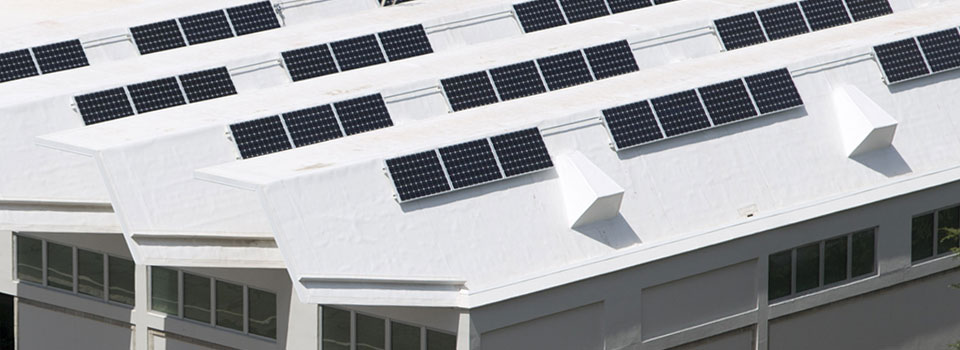At the University of Georgia, every watt counts. Through a number of programs, facilities and key initiatives, UGA constantly works toward creating an energy-conservative campus.
In 2012, UGA developed the 2020 Strategic Plan that calls for urgent action on energy and climate change. The plan, supported by UGA’s Office of Sustainability and the Georgia Initiative for Climate and Society, works toward a number of key goals. These include reducing carbon emissions by 20 percent and university consumption of energy by 25 percent. UGA also intends to increase purchases and generation of energy from renewable sources by 10 percent each. The 2020 Strategic Plan guides many of the energy choices the campus makes, with a sustainable and efficient environment in mind.
Governor’s Energy Challenge
The Governor’s Energy Challenge kicked off in 2008 when state agencies each agreed to reduce their energy consumption by 15 percent by 2020. UGA pledged to accept the Governor’s Energy Challenge to reduce energy usage per square foot by at least 15 percent. However, UGA sought to go beyond the minimum requirement.
“This proclamation mandated that all state agencies reduce energy consumption by 15 percent per square foot by the year 2020,” said David Spradley, director of energy services at UGA. “We achieved this at the end of FY 2014, six years ahead of the deadline. Our internal UGA goal is a 25 percent reduction by 2020, and we are confident that we will achieve that target.”
To achieve that goal, UGA has upgraded energy in over half of its buildings on the main campus. This has resulted in a 5 percent reduction in overall energy costs. The university also educated students, faculty and staff on personal energy conservation.
Facilities Management Division
The UGA Facilities Management Division works to conserve campus energy around the clock. The division oversees a number of key departments, including Energy Services, Engineering, Grounds, Operations & Maintenance and Sustainability, to name a few. The mission of the Facilities Management Division is to maintain and enhance UGA through quality service and stewardship of UGA’s natural and physical resources. The departments in the Facilities Management Division work together toward creating a better UGA.
Energy Services Department
The Energy Services Department is responsible for the management and inspection of the UGA main campus, Health Sciences Campus and nearby research farms. The department leads energy efficiency and energy saving projects and reduces UGA’s carbon footprint.
The department has also developed the Guaranteed Energy Savings Performance Contract, where firms compete to provide solutions to reduce energy consumption and costs. The efforts of the Energy Services Department save money and make UGA an overall more sustainable environment.
Office of Sustainability
The Facilities Management Division also includes the Office of Sustainability, which provides a number of grants, programs and technologies to increase energy efficiency. The UGA Campus Sustainability Grants Program offers funding to student-proposed projects and initiatives that advance sustainability through education, research, service and campus outreach. Projects address the goals of the 2020 Strategic Plan and are meant to inspire and inform the UGA community about sustainability.
Air Conditioning
Air conditioning consumes the largest amount of energy on campus. In order to minimize that usage, steam and chilled water loops expand to heat and cool campus buildings. Faculty and staff can submit a Too Hot/Too Cold Work Request to conserve air conditioning. The university also reduces temperature settings and shuts down systems over holiday breaks. Unnecessary heating and cooling systems are turned off when campus is shut down. The efforts of the Facilities Management Division save UGA over $100,000 each year.
UGA Solar Demonstration Project
A partnership between the Office of University Architects, the Facilities Management Division and the Office of Sustainability, the UGA Solar Demonstration Project researches renewable solar energy on campus. The UGA Solar Demonstration Project extends to a number of locations on UGA’s main campus. Solar panels, which convert sunlight to electricity, are installed on the roof of the Jackson Street Building. The panels generate 30,000 kilowatt hours of electricity each year. In addition to the Jackson Street solar panels, the UGA Club Sports Complex hosts solar powered parking lot lighting. The UGA Bioconversion Center, with a grant acquired by the College of Engineering, uses a solar thermal hot water system.
Electric Vehicle Charging Station
In the spring of 2014, UGA implemented its first electric vehicle charging station in the North Campus parking deck. The station, which includes the first public level 2 electric vehicle charger in Athens, charges vehicles in two hours. Electric car owners can use this source of alternative fuel for a low cost. The university plans to add more charging stations to campus in the future.
LEED Buildings
UGA works to design and build structures that conserve the maximum amount of resources. In order to construct environmentally responsible buildings, UGA is pursuing Leadership in Energy and Environmental Design, known as LEED, certification on a number of projects.
Four building projects have received certified LEED gold status:
- Jackson Street Building
- Residence Hall Building 1516
- Tate Expansion
- Georgia Museum of Art Addition
Two other projects that are LEED-registered and tracking certification at the silver or gold level are the College of Pharmacy addition and the Richard B. Russell Building Special Collections Libraries. Once certified, these buildings will establish a half-million square feet of documented LEED space in the university’s facilities inventory.
